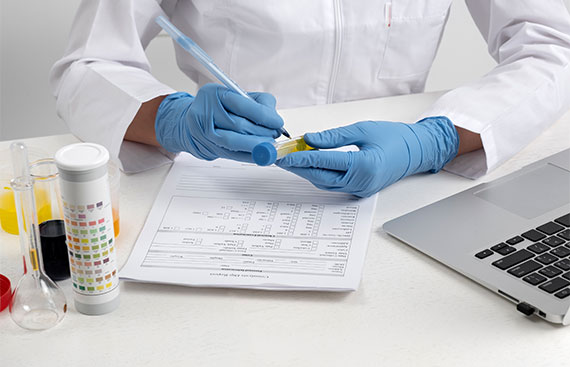Analysis of Peptide BPC-157 Research

The stomach acid contains a protective peptide called BPC, which has been suggested to have curative effects on the upper and lower GI tract. Peptide BPC 157, an abbreviation for "body protection compound," is a 15-amino acid peptide chain. The protective protein BPC 157 in gastric juice [i] is the synthesized peptide BPC source.
BPC 157, a physiologically active peptide, is reported to be extremely stable and likely resistant to enzyme digestion. Studies suggest it may inhibit inflammation, stimulate tissue repair, and control gene transcription. The alleged anti-inflammatory and fatigue-mitigating properties of BPC 157 inspired the substance's moniker. Research suggests that BPC 157 may be a beneficial chemical for the gastrointestinal tract [ii] due to its potential regeneration capabilities.
Peptide BPC 157, also called gastric pentadecapeptide BPC 157, has been linked to the following properties in research studies:
- May help with tendon injuries
- Potential maintenance of cell viability
- Possible growth in tendons
- Alleged protection of cells
The gastric juice BPC protein is reported to be incompletely represented by BPC 157. Research suggests that [iii]:
- It may dissolve quickly in liquid.
- It may not be broken down by water or consumed by enzymes.
- It may keep the overall equilibrium.
- It may attend to organ-failure models.
- It may boost angiogenic repair speed.
- It may enhance joint flexibility.
- It may help with chronic pain from injuries and joints.
The effects of BPC 157 on inflammatory bowel disease (IBD) are now being studied in research studies. The scientific community has reported beneficial findings in research studies exploring BPC 157's potential in mitigating gastrointestinal problems such as stomach ulcers and inflammatory bowel disease in animal test subjects.
Findings imply that the alleged characteristics of BPC 157 may also aid weight loss and muscle recovery.
How Do BPC 157 Peptides Work?
Since BPC 157 is an extract of the BPC protein found in stomach acid, investigations purport that its main potential action may be to speed up the renewal and repair of the digestive tract. The intestines perform essential activities and are under constant stress. Researchers speculate that BPC 157 may aid in bowel regularity by:
- Potentially regulating blood vessel function.
- Potentially restoring balance to the microbiome.
- Potentially keeping stomach ulcers at bay.
- Potentially repairing the gut lining and epithelium by creating new cells [iv].
Scientists hypothesize that BPC 157 may exhibit potential properties within and outside the gut. For instance, studies suggest that BPC 157 may aid muscle and tendon recovery by increasing blood vessel development (angiogenesis). This explains why BPC 157 could help recovery in lesions and wounds [v].
Because of proposed angiogenesis, wounded areas receive a greater supply of oxygenated, nutrient-rich blood and cellular energy, speeding the healing process.
It has also been hypothesized that BPC 157 may inhibit the ability of 4-hydroxynonenal to promote the repair of muscles and tendons. As a result, more receptors for communicating with growth chemicals are produced by tendon cells. Tendon cells proliferate faster when the tendon is mending [vi].
Research suggests that nitric oxide (NO) generation is key to the mechanism through which BPC 157 may potentially reduce hypertension [vii].
To fully understand how BPC 157 may operate in the brain, more research is required to explore its potential effect on neurotransmitters, including dopamine and serotonin [viii].
BPC-157 Peptide and Gut Health
Findings imply that the communication pathway between the brain, gut, immune system, and microbiota may possibly be further stabilized by BPC 157. Investigations purport that in rats, BPC 157 may effectively mitigate the effects of stomach ulcers and prevent gastrointestinal fistula development [ix].
Researchers speculate that the presentation of BPC 157 may positively lower inflammation in models with arthritis and stomach ulcers [x].
BPC 157 Peptide and Irritable Bowel Syndrome (IBS):
Scientists hypothesize that by reducing inflammation and mitigating IBD symptoms such as ulcerative colitis, intestinal swelling, esophageal reflux, and esophagogastric anastomosis, BPC 157 may exhibit positive action. One study posited that BPC 157 may significantly decrease inflammation in rats with irritable bowel syndrome [xi].
BPC-157, Wounds, Burns, and Lesions
Studies imply that substances containing BPC 157 have been suggested to hasten the recovery of burned mice in laboratory studies [xii].
Research suggests diabetic rats given BPC 157 displayed significantly faster wound healing than control rats [xiii].
Another study implied that the peptides in BPC 157 may have accelerated the recovery of rabbits with shattered bones [xiv].
BPC-157 Peptide, Muscle and Tendons
Several empirical studies have suggested that the presentation of BPC 157 has been speculated to aid in tendon healing following damage to the Achilles tendon. They have also been suggested to aid in the recovery of crushed or cut muscles [xv].
Buy BPC-157 if you are a researcher interested in further studying this compound. Please note that none of the above substances has been approved for human consumption, which is strictly prohibited by law.



